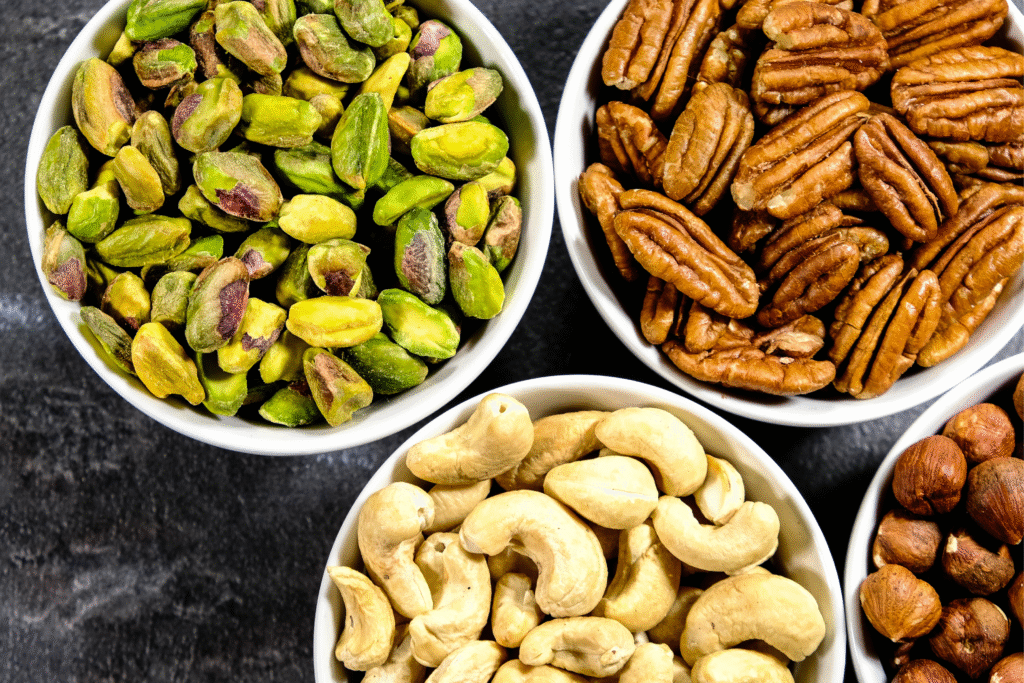People who eat more nuts may be less likely to die of heart disease, according to a new study published Oct. 16 in the Journal of Nutrition.
“Although nuts are nutrient-dense foods rich in unsaturated fats, plant protein, fiber, and several vitamins and minerals, their high fat and calorie content has historically made people hesitant to include them regularly in their diets,” lead study author Montry Suprono, DDS, associate professor and director of the Center for Dental Research at Loma Linda University, told Health.
But these findings “strengthen the existing evidence” suggesting that nuts can reduce the risk of heart disease death, he said.
Cardiovascular disease (CVD) is responsible for one in three deaths in the U.S., making it the leading cause of mortality. The most common form is coronary artery disease, also known as ischemic heart disease (IHD), which develops when the arteries become narrow and the heart struggles to pump blood throughout the body.
For this study, Suprono and the other researchers tracked over 80,500 participants, all of whom were Seventh-Day Adventists.
Via a questionnaire, the team documented participants’ normal nut consumption. They included tree nut intake—which included almonds, cashews, walnuts, and mixed nuts—as well as total nut intake, which counted tree nuts, peanuts, and peanut butter.
Over an average of 11 years, 4,258 people died from CVD—1,529 of those were attributed to IHD specifically.
The data showed that people with the highest total nut intake had a 14% lower risk of dying from CVD and a 19% lower risk of dying from IHD as compared to those who had the lowest. The greatest reduction was seen in those who ate the most tree nuts—they had a 27% lower risk of IHD mortality.
Nuts Make For a Heart-Healthy Swap, Too
Beyond these initial findings, the researchers also wanted to see whether eating more nuts in place of less healthy foods could have a positive effect on CVD mortality risk, too.
Using statistical models, Suprono and his team predicted the impact of substituting one serving of nuts (28 grams) or peanut butter (1 tablespoon) with other foods.
They found replacing any other food with tree nuts, peanuts, or peanut butter lowered the risk of dying from CVD by 15–22% and IHD by 17–29%.
Tree nuts were even more effective:
- Substituting unprocessed red meat for tree nuts reduced CVD mortality risk by 44% and IHD mortality risk by 38%.
- Swapping processed meat, snacks, sweets, eggs, cheese, and fried potatoes for tree nuts lowered CVD mortality risk by 19–26% and IHD mortality risk by 20–31%.
A Few Important Caveats
The results of this study are robust, largely because the “sample size is very large, the duration of the study is long, and the authors adjusted for concomitant factors such as diet, demographics, and lifestyle,” explained Sandra Arévalo, MPH, RDN, spokesperson for the Academy of Nutrition and Dietetics.
However, there are a few limitations. For one, Seventh-Day Adventists are generally healthier than other Americans—many avoid smoking and alcohol, and embrace a vegetarian diet and regular exercise. “These features might limit how directly the findings apply to the general population,” said Suprono.
The authors also reported funding from the California Walnut Commission and the Almond Board of California. “However, there are other studies from other years and authors that sustain the same results,” Arévalo told Health.
A diet rich in fruits, leafy green vegetables, whole grains, lean protein—and nuts—has been linked with multiple factors that improve heart health over time, including:
- Lower blood pressure
- Improved microbiome diversity
- Decreased vascular inflammation
- Lower LDL cholesterol and higher HDL cholesterol levels
With nuts in particular, many of their cardiovascular benefits likely stem from their healthy fat content.
Certain foods—such as beef, pork, butter, and fried foods—contain saturated fats. “Highly saturated fats are associated with increased LDL cholesterol,” Eleanor Levin, MD, clinical professor of medicine and obstetric cardiologist at Stanford University, told Health. “The LDL [cholesterol] clogs up the arteries of the heart.”
On the other hand, she said, nuts are rich in monounsaturated fats, which are associated with lower LDL cholesterol. “Good fats help to keep veins and vessels smooth, flexible, clean and healthy,” Arévalo said.
Beyond just healthy fat content, nuts also contain “plant sterols, magnesium, fiber, and vitamins that may help reduce inflammation, and to some degree, blood pressure,” Suprono added.
Due to their links to better heart and metabolic health, nuts are definitely healthy addition to your diet.
However, there are some things to keep in mind:
- Mix it up. Nuts vary in protein, fat, and fiber content, so “it is good to eat a variety,” said Arévalo.
- Don’t overdo it. “Be careful not to exceed your intake of nuts,” she advised. Nuts tend to be higher in calories, so eating too many could make it harder to manage your weight.
- Keep it simple. “Choosing unsalted or minimally processed nuts helps limit sodium, added oils, and sugars,” said Suprono.
To incorporate more nuts in your diet, Arévalo suggested eating them as a snack or using them as a topping for salads, stews, or other meals. If you don’t like the taste, nut butters might be another option to consider.
The healthiest nut varieties include almonds, hazelnuts, peanuts, pecans, pistachios, and walnuts.


